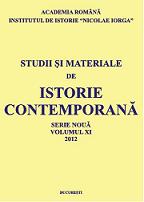Tentaţii federaliste: români, maghiari şi problema autonomiei
Transilvaniei în perioada interbelică
Federal Temptations: Romanians, Hungarians and
Transylvanian Autonomy in Interwar
Author(s): Daniel CitirigăSubject(s): History
Published by: Institutul de Istorie Nicolae Iorga
Keywords: Federalism; autonomy; centralism; Transylvania; Old Kingdom; Hungary
Summary/Abstract: The End of The First World War brought an absolutely new reality in Central Europe, following the collapse of the four Empires: German, Austro-Hungarian, Russian and Ottoman. New states sprang on the geopolitical map, but, however, their experience was limited to that from the Middle Ages; any other incumbent to statehood has been lost more than a century ago. The Empires have been divided into several regions. Some of those regions have merged with states that have already enjoyed independence. Taking into consideration this context, we must not be surprised that both during and after the war, Central Europe became the region where the number of federal projects increased. Transylvania made no exception, since, in 1918, after a long life under Habsburgs, this province was united with Romania. Ideas of federality were not unknown in this region, since debates regarding federalization had a long history during the Dual Monarchy. This work paper concentrates on two aspects: on the one hand, the Romanian leaders from Transylvania agreed to accept provincial autonomy soon after 1918 and, on the other hand, Hungarian leaders from Transylvania promoted and maintained the idea of autonomy during the war even though their reasons and political targets were different from those of the Romanian leaders.
Journal: Studii şi materiale de istorie contemporană (SMIC)
- Issue Year: 2012
- Issue No: 1
- Page Range: 25-41
- Page Count: 17
- Language: Romanian
- Content File-PDF

